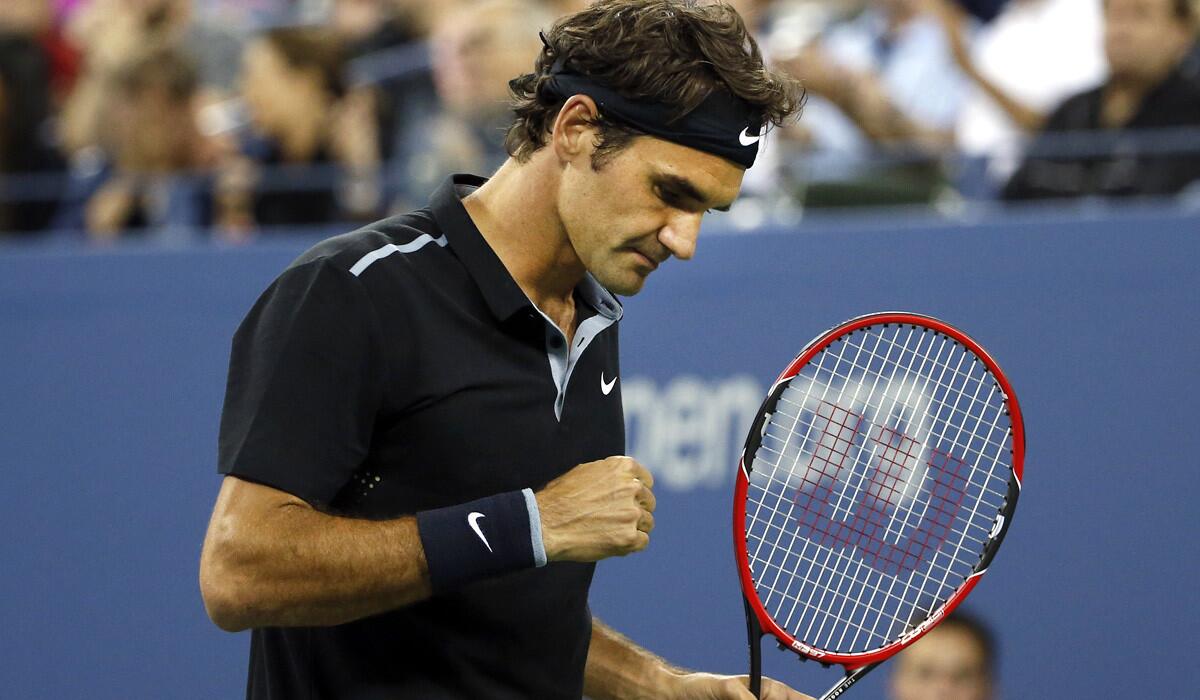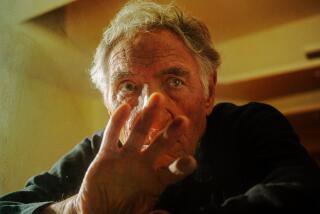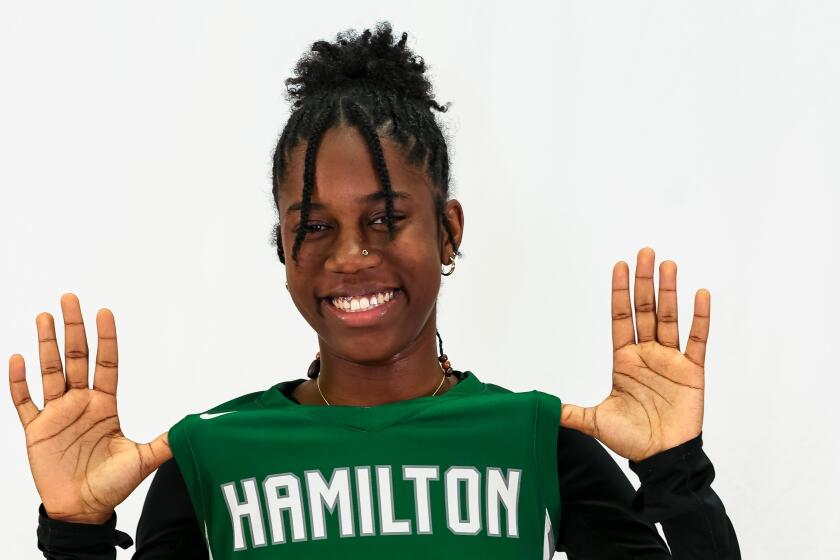Column: As always, Roger Federer owns the night at the U.S. Open

From New York — It was a near perfect Friday night in the bustling suburb of Flushing.
The temperature was cool, but not chilly. The lights were blazing at Citi Field for a Mets home game and the No. 7 train was delivering hordes of people from Manhattan to the Willets Point Station for the game and the U.S. Open tennis tournament across the way.
There, in front of 22,500 people, Roger Federer was shooting fish in a barrel. As usual.
Nighttime play at the Billie Jean King Tennis Center, and inside Arthur Ashe Stadium, is often more party than tennis. For years, Federer has been the perfect host.
He took the court looking like a movie title. He was the man in black — shirt, shorts, headband, even shoes. The only thing missing was a bow tie.
This was the 25th time in his 16-year career that he has been the nighttime show. Twenty-four times he has not only entertained, but won. In 2012, he lost a quarterfinal at night to Tomas Berdych. That’s the only one.
Friday night’s mackerel was one of those classic unknowns who get a big win or two in the early rounds and suddenly find themselves fodder in the USTA’s “Tonight Show,” hosted by Roger.
Sam Groth, victim No. 24, did not come to the party completely without reputation. He is a husky Aussie, 6 feet 4, 215 pounds, with a heavy beard. You get the feeling you’d have a great time with him over dinner and 10 Fosters.
He also once hit a serve that was clocked at 163.4 mph in an ATP Challenger event. Because it was a Challenger, it does not get official listing as the fastest serve ever on the tour. That still goes to 6-foot-11 Ivo Karlovic of Croatia, who hit one 156.
Still, Groth’s big serve sure gets the attention of the people he plays.
After Federer won his first-round match Wednesday night, he was asked by ESPN’s on-court interviewer, Brad Gilbert, if he were aware that his next opponent had once hit a serve 163. Federer’s eyes got big and he said, “What?”
That, however, was apparently the last moment of concern for the 17-time Grand Slam champion and five-time U.S. Open winner. He handled the Groth sizzle comfortably, winning, 6-4, 6-4, 6-4.
He actually out-aced the ace man, 9-8, and even returned one 147-mph bomb and got it back at 142 for a winner.
Asked afterward if he’d had his eyes open or closed when he got the 147 serve back, he joked, “Got to check the replay. I’m not sure.”
Then he launched into a recitation on how, once the serve speed passes the 135 range, it’s almost so fast that luck plays a role. He added that he can often feel on his racket how fast it was, and he can read a little bit when the big one is coming because the server’s body tightens before he lets go.
In other words, while he can have a sense of humor about the ridiculousness of trying to return serves at that speed, he also has a plan to do it. Federer leaves nothing to chance.
“I’m aware of every serve, how hard it is after the point when he goes big,” he said. He added that he always checks the speed gun, “because I think it is interesting and I want to see.”
Even after all these years, he remains an amazing show. At 33, and at a time when it is fashionable to presume these twilight years will soon turn to retirement, he still has a way of dazzling.
Groth’s serve was all bombast, noise and muscle. Federer’s is quiet surgery, and twice as effective. The aces of Groth and so many like him knock you on your back and you know immediately. Federer’s are quick little incisions. Before you feel the pain, you have bled to death.
In the midst of all the bustle that is night tennis at the U.S. Open, with all the Federer caps and shirts that read “Roger That,” he plays tennis with a quiet precision that you wish somebody could bottle.
Groth, the guy serving bombs, won the point on his first serve 59% of the time. Federer, with his slick darters, won it 84% of the time.
When Muhammad Ali coined his “float like a butterfly, sting like a bee,” he was also framing Federer’s tennis style in picture-perfect terms.
Groth lost the first set when he volleyed long. He followed that by launching a ball in anger into the upper deck at Ashe Stadium, no small feat in this huge place. At the end of the night, it ranked up there with his most successful strokes.
He did break Federer’s serve twice, something he can tell his grandchildren someday, and he did compete well under the circumstances, knowing full well that this was all about the other guy.
In the third set, Groth was up a break and in good position to force a fourth set. Federer merely brushed his hair back and figured out what to do next.
Minutes later, Groth’s service return nestled into the net on match point and Federer, after shaking hands at the net, did what he has done so many times under the lights at Ashe.
He walked to the middle of the court, smiled and waved to the adoring fans, who were on their feet and cheering.
For Federer, it was an outburst of emotion.
More to Read
Go beyond the scoreboard
Get the latest on L.A.'s teams in the daily Sports Report newsletter.
You may occasionally receive promotional content from the Los Angeles Times.











